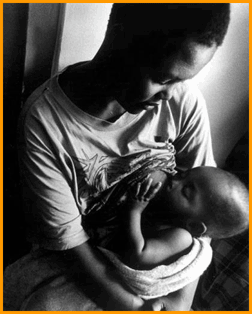The outlook of Partners in Health is nothing if not optimistic; envisioning life as a joyful opportunity, rather than a struggle, for all the people of the world, they devote a large amount of their resources to the preservation and development of life in its early stages. Death during or as a cause of pregnancy is as frequent in the third world today as it was throughout the world hundreds of years ago--the modern world has since surpassed this obstacle to the point that few first-world mothers ever die in childbirth; however, developing communities are still needlessly afflicted. Similarly, 7 million children die annually from easily treated situations and diseases: malnutrition, pneumonia, diarrhea, malaria, measles. Mother-to-child transmission of HIV greatly increases the effects and frequency of the disease, making the fight against the virus futile while it continues. PIH endeavors to make women's and children's health a top priority in order to give each miracle of life the chance it deserves..

Mother nursing child with HIV. |
An unvaccinated child in the first world, with a reasonable living standard, can easily get sick and die. Combine this susceptibility with substandard living conditions, overcrowded housings, little food, and no medical attention in the third world, and the numbers of deaths from lax or nonexistent vaccinations increases tenfold. The health of children in the third world is completely tied into their environment, so PIH's community networks work tirelessly to provide every child they reach with clean water, food, vaccinations, and the chance at an education that every child deserves. Salud Infantil, the branch of Peru's Socios En Salud that focuses on child health, not only provides the medicines and food that are imperative for a healthy child. Going beyond the basics, they provide community support for all their patients, and everything from music to swimming lessons to encourage creative and energetic growth.
No matter how great the strides PIH makes in creating a better living environment for children, they are nevertheless often thwarted in their efforts by the child-killing juggernaut that plagues the third world endlessly: AIDS. Although an affective and easy method of reducing mother-to-child transmission of HIV by nearly 95% has been available to the world for more than a decade, 2.3 million mothers and children in the developing world still suffer. Besides these millions afflicted, an estimated 10 million AIDS orphans (that is, children whose parents have been killed by the disease) live in Africa alone, many responsible for the wellbeing of other children. PIH seeks to limit the effects of the disease to the diseased alone, while simultaneously battling the virus. By providing quality OB-GYN care and family planning aid for the mothers, along with emergency caesarian section operations to decrease the risk of transmission, the Partners in Health medical team seeks to treat this daunting obstacle the way it treats all others: relentlessly.

